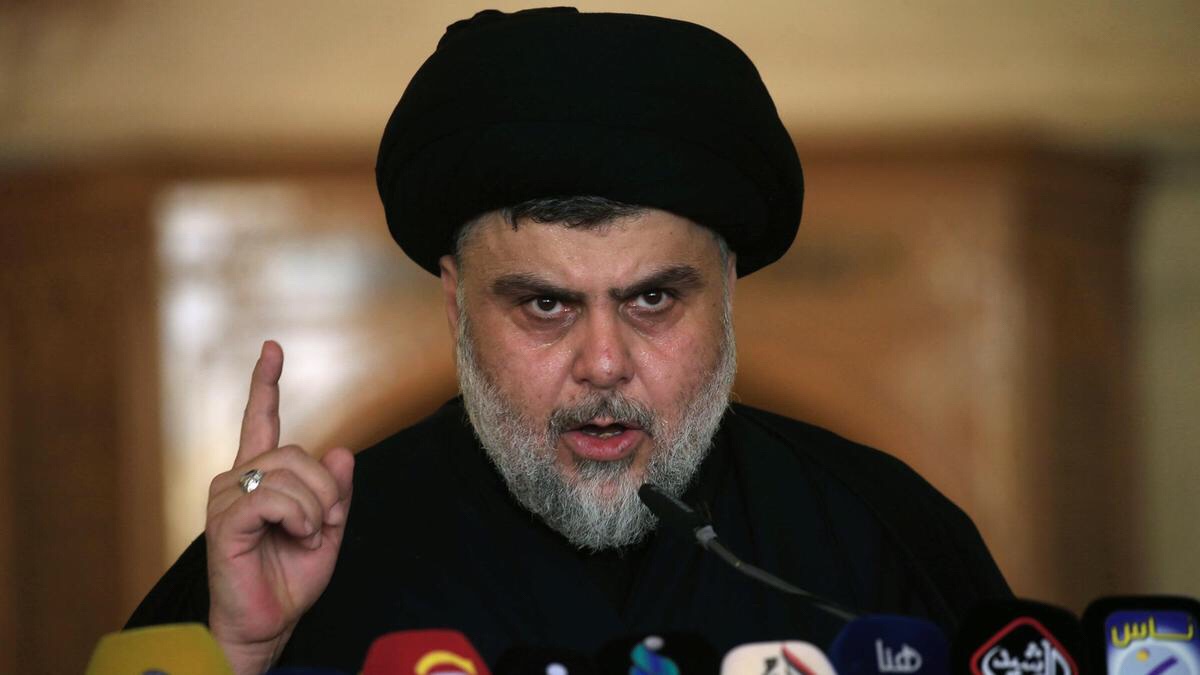
Iraqi Shiite populist cleric Moqtada Al Sadr delivers a sermon to worshippers during Friday prayers at the Kufa mosque near Najaf, Iraq, September 21, 2018. Reuters
Sadr gives Iraq PM-designate free hand but demands deadline for reforms
The populist cleric says politicians loyal to him will not be part of new government
Iraqi populist cleric Moqtada Al Sadr warned on Thursday that prime minister designate Adel Abdul Mahdi must achieve significant reforms within a year or face a nationwide uprising.
Mr Abdul Mahdi has 30 days to bring together sharply divided Iraqi political factions and present a cabinet that wins parliamentary approval before he can begin governing. If he fails, another candidate will have to be chosen for the prime minister's post.
"We have begun the steps of reform … we managed to make the prime minister designate independent from the corruption seen in the previous administration," Mr Al Sadr said on Twitter.
The cleric said he would not propose candidates for cabinet positions, instead giving Mr Abdul Mahdi free reign over appointments.
"We have ordered the formation of this new cabinet without partisan pressures or sectarian divisions while preserving Iraq's true identity," Mr Al Sadr said.
Mr Al Sadr, alongside outgoing Prime Minister Haider Al Abadi, leads one of the two main Shiite blocs. The other is led by Iran-backed militia leader Hadi Al Amiri and former premier Nouri Al Maliki.
The largest bloc traditionally appoints the prime minister and presides over the formation of the next government, but the exact contours of a new governing coalition are yet to be drawn.
Iraq is suffering from an infrastructure crisis, corruption and wasteful spending. This led to months of protests in southern Basra where nearly 100,000 people have been hospitalised because of contaminated drinking water. Protesters have demanded action to fix the stagnant economy and provide better services.
Baghdad also faces a political crisis with the northern Kurdish region over the budget, governance, oil and gas.
UN Secretary General Antonio Guterres said on Wednesday that he hoped for the "swift" formation of an "inclusive" Iraqi government.
After months of delay following the May 12 election, political developments unfolded quickly on Tuesday night with parliament electing Barham Salih – a moderate Kurd – to the presidency. Mr Salih immediately named independent Shiite politician and former vice president Mr Abdul Mahdi as his prime minister designate. Both politicians are long-standing members of the political class that has dominated Iraqi politics.
Mr Salih, of the Patriotic Union of Kurdistan (PUK), won the votes of 220 of the 273 MPs present on Tuesday for a second round vote. The PUK and its main rival, the Kurdistan Democratic Party (KDP), had struggled to agree on a nominee for president, threatening their usually united front in regard to Baghdad.
The KDP candidate Fuad Hussein, a chief of staff to former Kurdish president Massoud Barzani, received 90 votes in parliament's first ballot while Mr Salih, a former Iraqi deputy prime minister, got 165 votes.
Kurdish parties are also on edge after the results of elections for the semi-autonomous Kurdish region's parliamentary were postponed due to complaints of fraud.
The results were to be announced on Wednesday but the electoral commission said it had to examine 400 complaints first.
The commission's preliminary results showed the KDP in the lead with 45 seats and the PUK in second place with 21.
More than 700 candidates competed for 111 seats, 11 of which are reserved for religious and ethnic minorities, five for Turkmen candidates, five for Christians and one for the Armenian community.
An estimated three million people were eligible to vote across three provinces in the region, but many were disillusioned after years of debt problems, corruption and cuts to public salaries.
No comments:
Post a Comment